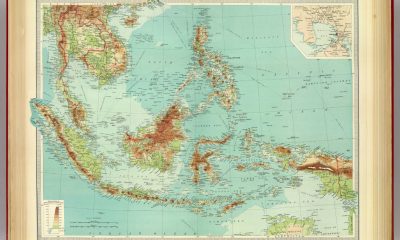#Islam
The Four Traits Of Highly Successful Muslims: Teachings From Surah Al-Kahf
Published

Virtues of Surah Al-Kahf
It was reported that the Messenger of Allah ﷺ said “Whoever reads Surah Al-Kahf on the day of Jumu’ah, will have a light that will shine from him from one Friday to the next.” [Mustadrak al-Hakim; Sahih at-Targhib wa at-Tarhib 736]
The Prophet 
Abu al-Dardā’ reported that the Messenger of Allah ﷺ said “Whoever memorizes ten ayat from the beginning of Surah Al-Kahf will be protected from the Dajjal.” [Sahih Muslim 809]
Discussing the Dajjal in detail is beyond the scope of this article, but the focus will be on how each story in Surah Al-Kahf highlights a certain characteristic and how each characteristic builds upon the previous one. Just as the surah begins with
“Praise be to God, who sent down the Scripture to His servant and made it unerringly straight” [18:1]
Keep supporting MuslimMatters for the sake of Allah
Alhamdulillah, we're at over 850 supporters. Help us get to 900 supporters this month. All it takes is a small gift from a reader like you to keep us going, for just $2 / month.
The Prophet (SAW) has taught us the best of deeds are those that done consistently, even if they are small. Click here to support MuslimMatters with a monthly donation of $2 per month. Set it and collect blessings from Allah (swt) for the khayr you're supporting without thinking about it.
These four characteristics are a road map and a straight shot to success. Moreover, Allah 
Trait #1: Unshakeable Iman
In the first story of the young men of the cave, a group of youth faces the fitan of deen. They are persecuted for believing in only Allah 

“And We made firm their hearts when they stood up and said, “Our Lord is the Lord of the heavens and the earth. Never will we invoke besides Him any deity. We would have certainly spoken, then, an excessive transgression.” [18:14]

Lessons from the story of the cave
[PC: Ivana Cajina (unsplash)]
 strengthened their hearts upon the truth. Notice how their hearts were strengthened after they proclaimed and stood for the truth. This is an important lesson for us as the help of Allah
strengthened their hearts upon the truth. Notice how their hearts were strengthened after they proclaimed and stood for the truth. This is an important lesson for us as the help of Allah  will sometimes come after we have sincerely taken the first step towards goodness – not before.
will sometimes come after we have sincerely taken the first step towards goodness – not before.
Due to the threats these young men received, they decided to leave their town in order to protect their imaan. The story goes on and Allah 

In this first story, what characteristics did these young men exhibit? They had unshakeable faith in Allah 



“Be mindful of God, and He will take care of you. Be mindful of Him, and you shall find Him at your side. If you ask, ask of God. If you need help, seek it from God. Know that if the whole world were to gather together in order to help you, they would not be able to help you except if God had written so. And if the whole world were to gather together in order to harm you, they would not harm you except if God had written so.” [Tirmidhi]
Trait #2: Humility
In the second story, Allah 


In this second story, which characteristic did the neighbor of the man of the two gardens exhibit? He displayed humility and was humble and grateful to Allah 


The Prophet 
“No one will enter Paradise in whose heart is an atom’s weight of arrogance… arrogance means rejecting the truth and looking down on people.” [Tirmidhi]
Arrogance can lead to the destruction of one’s dunya and akhirah.
Trait #3: Seeking Beneficial Knowledge
In the third story, we learn about the fitan of knowledge through the journey of Musa 


“Once Moses stood up and addressed Bani Israel. He was asked who was the most learned man among the people. He said, ‘I.’ Allah admonished him as he did not attribute absolute knowledge to Him (Allah).” [Bukhari]

Lessons from surah al-Kahf [PC: Indra Projects (unsplash]
 gives us more details regarding this story. After Allah
gives us more details regarding this story. After Allah  admonishes Musa
admonishes Musa  , Musa
, Musa  immediately humbles himself and goes to meet and learn from Khadr
immediately humbles himself and goes to meet and learn from Khadr  , a prophet of Allah
, a prophet of Allah  sent to another nation. And with him, Musa
sent to another nation. And with him, Musa  catches a glimpse of how Allah
catches a glimpse of how Allah  protects and has mercy on His Servants in ways we cannot possibly imagine and understand.
protects and has mercy on His Servants in ways we cannot possibly imagine and understand.
In this third story, which characteristic did Musa 
In my personal experience, being born in Pakistan and growing up in a traditional desi household, there is a huge push to get our secular education and do well in school. Many of us are pushed to pursue careers in medicine, law, engineering, and other respectable and high-paying professions. But as the Prophet 
“When Allah wishes good for someone, He bestows upon him the understanding of Deen.” [Bukhari and Muslim]
Just as we pursue excellence in our secular education, we should also pursue at the very least competence -if not also excellence- in our knowledge of our deen. Most of us will not become scholars of Islam, but we should know the fundamentals of our religion well and the basics of the specialized areas we are regularly engaged in. For example, someone involved in business and finance should at least have a working knowledge of the rulings and fiqh of business transactions, know who to ask when he has questions, and so on and so forth.
As a final point regarding this story, the legendary American football coach Vince Lombardi said, “The only place success comes before work is in the dictionary.” We cannot expect that we will gain an understanding of our deen just by sitting at home and making a half-hearted du’a. If we want to truly gain knowledge, it requires effort, perseverance, and sacrifice. Musa 





“Whoever travels a path in search of knowledge, Allah will make easy for him a path to Paradise.” [Muslim]
While the path to knowledge of our deen may not always be easy, the destination it leads to is worth it.
Trait #4: Serving Humanity
In the fourth and final story, Allah 


“We established his power in the land, and gave him the means to achieve everything.” [18:84]
Here we learn about the fitan of power. Allah 
The group offered to pay and reward Dhul Qarnayn but Dhul Qarnayn answered,
“The power my Lord has given me is better than any tribute.” [18:95]
After the barrier’s completion, Dhul Qarnayn declared,
“This is a mercy from my Lord. But when my Lord’s promise is fulfilled, He will raze this barrier to the ground: my Lord’s promise always comes true.” [18:98]
Yajuj and Majuj’s release and conquering of the earth near the End of Times are one of the major signs of the Day of Judgment as recorded in the books of hadith including Sahih Muslim.
In this fourth and final story, which characteristic did Dhul Qarnayn exhibit? He served and helped others – he used the knowledge and power he was blessed with and put it to use to fulfill the needs of humanity, directly building upon the third characteristic of seeking knowledge. Francis Bacon once said, “Knowledge is power” and we see that in the story of Dhul Qarnayn. Dhul Qarnayn did not keep the knowledge he had to himself – he used it to benefit others. As the Prophet 
“Allah helps the servant as long as he helps his brother.” [Muslim]
What is True Success?
Now, at the end of the surah, if we are able to incorporate these four characteristics into our lives, Allah 
“Indeed, those who have believed and done righteous deeds – they will have the Gardens of Paradise as a lodging,
Wherein they abide eternally. They will not desire from it any transfer.” [18:107-108]
It’s important to note that Allah 

“Al-Firdaws is the highest part of Paradise, and the center and the best of it.” [Tirmidhi, classified sahih by Shaykh al-Albani]
And unlike this temporary dunya, Paradise is truly forever.
In conclusion, the characteristic of success highlighted in each story builds upon itself in the following story. Only with true imaan will you truly be humble and have humility in front of Allah 
This is in contrast with those who do not have iman and humility: knowledge can lead to arrogance or questioning of Allah’s 
Now, every week as we recite Surah Al-Kahf, remember the roadmap to success Allah 
[Points for this article were drawn from Sh. Yasir Qadhi’s Lessons from Surah al-Kahf and special thanks to Shaykh Ahmad Saleem for his review and constructive feedback!]
Related:
Keep supporting MuslimMatters for the sake of Allah
Alhamdulillah, we're at over 850 supporters. Help us get to 900 supporters this month. All it takes is a small gift from a reader like you to keep us going, for just $2 / month.
The Prophet (SAW) has taught us the best of deeds are those that done consistently, even if they are small. Click here to support MuslimMatters with a monthly donation of $2 per month. Set it and collect blessings from Allah (swt) for the khayr you're supporting without thinking about it.
Abdullah Shaikh graduated from the University of Houston. He enjoys learning about academic Islam and is currently pursuing his Associate's degree online through AlMaghrib Institute. In his free time, he loves spending time with family and friends, playing video games, and visiting national parks to appreciate the natural beauty Allah SWT has created

You may like

The Four Traits Of Highly Successful Muslims: Teachings From Surah Al-Kahf

Study Classical Texts the Traditional Way | Session 2

The Grieving Prophet: How This Muslim Mother Finds Comfort In The Messenger’s Sorrow

Study Classical Texts the Traditional Way | Session 1
Keeping Our Children Safe From Predators: A Guide For Parents

MuslimMatters Official Statement On Wisam Sharieff

Why Mehdi Hasan’s “Lesser Of Two Evils” Election Advice Is Wrong

Statement Against Abuse: The Female Scholars Network

Israel Kills Yahya Sinwar: Hamas’ Iron Man Exits The Stage

Sami Hamdi: “Muslims Must Abandon Harris” | Transcript and Summary

Study Classical Texts the Traditional Way | Session 1

Sami Hamdi: “Muslims Must Abandon Harris” | Transcript and Summary

IOK Ramadan: The Importance of Spiritual Purification | Keys To The Divine Compass [Ep30]

IOK Ramadan: The Power of Prayer | Keys To The Divine Compass [Ep29]

IOK Ramadan: The Weight of the Qur’an | Keys To The Divine Compass [Ep28]
MuslimMatters NewsLetter in Your Inbox
Sign up below to get started
Trending
-
#Current Affairs1 month ago
Imams Call To “Abandon Harris” As American Election Looms
-
featured1 month ago
The Role Of Kurds In The Dissemination Of Islamic Knowledge In The Malay Archipelago
-
#Islam1 month ago
Husn Al-Dhann: The Path To Islamic Optimism
-
Announcements2 weeks ago
MuslimMatters Official Statement On Wisam Sharieff











